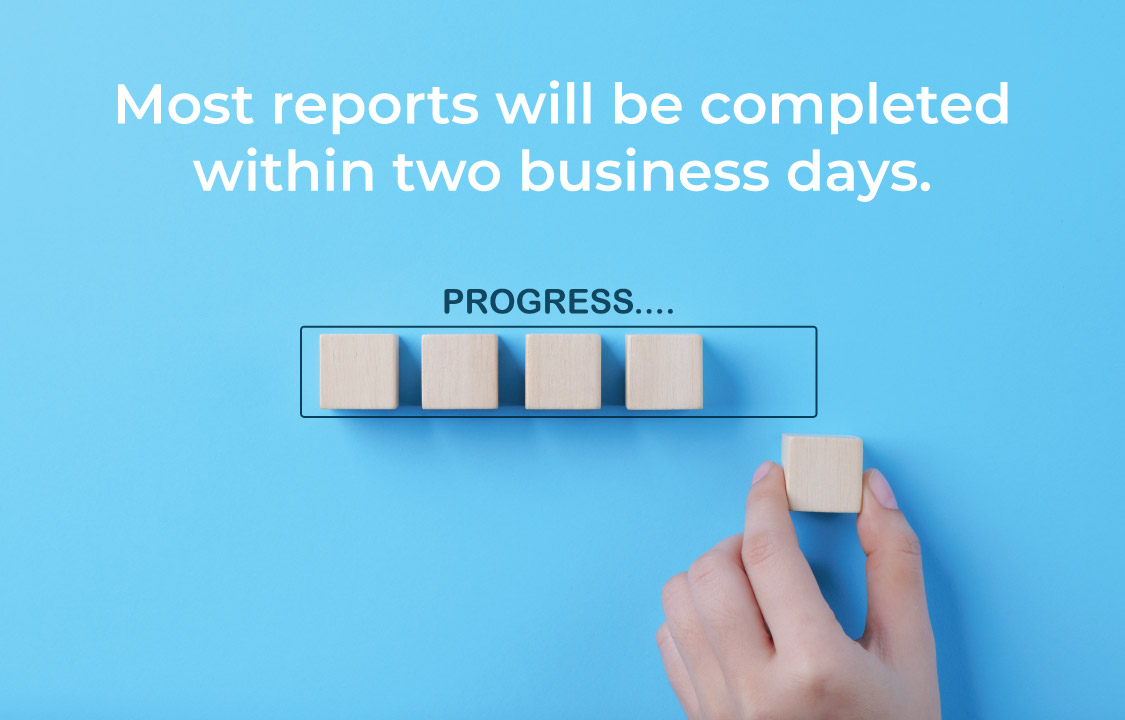Background checks can range from simple to very comprehensive. Depending on individual needs or employer requirements, checks will vary significantly in depth and detail. Which, of course, impacts completion timelines.
Looking for a new job? Learn how a personal background check can help you in your job search!
In the United States, organizations must comply with the Fair Credit Reporting Act (FCRA), which includes obtaining the required consent and authorization from a candidate before conducting a background check on them. Employers also have the responsibility of duly informing each candidate when they plan to take action based on information found in their background checks.
For a summary of information on FCRA compliance, check out this article.
One of the most common questions we receive from both employers and individuals is how much time background screenings take. Most consumer reporting agencies have similar answers—it depends.
Retrieving criminal records data and other consumer report information is a bit more involved than many tend to think. In a single, comprehensive background check, there can be a dozen or more information sources, including but not limited to county courthouses, federal courthouses, databases, state repositories, credit bureaus, and educational or other private institutions. Each of these sources may have unique data retrieval protocols or circumstances that result in delays.
Many organizations also opt to implement drug and health screening solutions. This can further extend timelines, depending on several factors often beyond the screening provider’s control. The duration of a background check depends on numerous factors.
What Can Make Background Reports Take Longer?
The average employment background check we process takes just over one business day to complete, depending on the nature and scope of the check. However, in certain situations, there may be hold-ups. These are some of the most common:
1. Unresponsive Parties
This is particularly relevant when it comes to verifications and reference checks. At times, it can be challenging for a background screening provider to establish contact with educational institutions, employers, and other relevant parties. There are also times when additional information is required from a candidate to verify a record, degree, employment history, or identity. Timelines can be extended when key individuals are slow to provide requested information.
2. Backlogged Courts
There are thousands of courthouses across the country. Odds are, a courthouse somewhere is currently experiencing delays due to staffing issues, limited resources, natural disasters, or any number of other circumstances. This can increase the time required to complete criminal record checks. Moreover, there are a few outlying municipal court jurisdictions whose records have not yet been digitized. This means a court runner or a county clerk must manually procure any criminal information requested from these jurisdictions. This can take anywhere from 3 to 30 days, depending on the case and county.
3. Drug Screening
Drug testing can be a rather involved process requiring collection facilitation, laboratory analysis, medical review, and, on occasion, retesting. At times, the logistics of coordinating drug tests in more remote areas of the county can cause a delay. When results are a lab-verified positive, a Medical Review Officer (MRO) will need to verify prescriptions with the candidate to exclude authorized substance use as a reason for failure. Completion of the report is put on hold until the candidate responds and the MRO completes their analysis.
4. Multiple Sources
Background checks that require searching multiple sources and databases are likely to take longer than those that are less comprehensive.
5. Use of Aliases
Many people change their names or use aliases at some point in their lives. At times, candidates may attempt to use an alias in an effort to avoid detection. Although they are very unlikely to be successful in doing so, such an action may cause slight delays.
6. International Background Verifications
Generally, international background verifications take longer than domestic checks. This is usually because non-US courts, government bodies, and police ministries all work a bit differently. There are language and process barriers, as well as systems that are not entirely synchronized with those in the US.
7. Inaccurate Information
Incomplete application forms or inaccurate information are a common cause of delays.
Turnaround Times by Search Type (General Guideline)
It is impossible to guarantee turnaround times for all reports. However, providers can set a general expectation based on averages. The following are general nationwide turnaround time averages across several search types:
- Most database searches (including nationwide criminal databases): Instant
- County criminal searches: 0-3 business days
- Verifications (third-party verifier): Within one business day
- Verifications (manual): 1-3 business days
- Drug screening: 1-3 business days
- Digital fingerprint screening: Within one business day (after collection)
- International Screening: 3-7 business days
What Can Speed Up a Background Check?
Peopletrail is often asked about ways to make a background check “go faster.” While there are no tricks that can hurry up things that are out of our hands, it is fairly easy to avoid things that can slow down the process.
We work to complete background verification reports faster by advising our candidates to do the following:
1. Keep Relevant Information Ready
Depending on the scope of the background search, candidates may be asked to provide information, such as alias names, addresses, dates of employment, educational degrees, and other relevant details.
2. Accuracy
Providing false or inaccurate personal identifier information or past employment/education details can add one or more days to the screening process. Data accuracy goes a long way in reducing turnaround times. An experienced research team will work to ensure data accuracy before time-consuming searches are initiated.
3. Quality Assurance
Background screening providers, such as Peopletrail, are bound by the guidelines of the Fair Credit Reporting Act to verify the accuracy of conflicting or adverse information before including it in the report. This quality assurance step may add time to the process in some instances. Still, it significantly mitigates the number of inaccuracies, disputes, and potential lawsuits, all of which require time in the long run.
4. Diligent Candidate Outreach
In certain situations, it becomes necessary for screening providers to contact candidates directly for missing pieces of information. Contacting a candidate is generally required if the provider encounters an unresponsive former employer or academic institution. Candidates can help in such situations by providing alternate proofs, such as W-2s or old pay stubs, and copies of diplomas.
Peopletrail Background Screening
The time it takes to complete a background check can indeed vary significantly. However, in most cases, the national average should be between one and two business days, with real-time updates on any delays. While instant background checks shouldn’t be the expectation, experienced screening specialists can often reduce a three-day waiting period to one business day.



